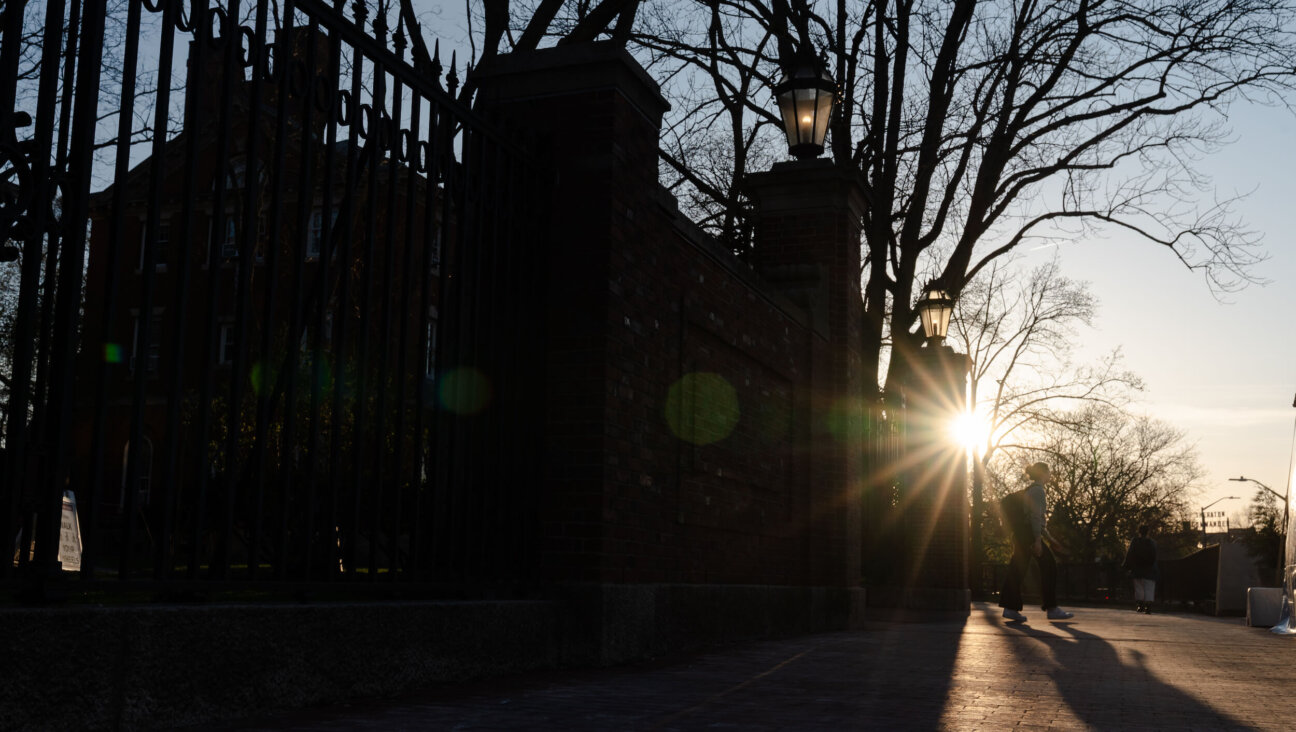Pro-Israel Lobby Girding For Tough Battle on Aid
WASHINGTON — Pro-Israel forces here are gearing up for a possible uphill fight to secure additional American aid to help cover the costs of Jerusalem’s disengagement plan.
The government of Prime Minister Sharon is asking the Bush administration for two separate aid packages totaling up to $1.6 billion to help defray the costs of the planned Israeli pullout from Gaza and the northern West Bank.
First, Israeli officials predict, Jerusalem could end up asking for as much as $600 million to help relocate military installations in Gaza. The second request, which is expected to be larger and more controversial, has not been formally submitted, but was thoroughly discussed Monday during Sharon’s visit to President Bush’s ranch in Crawford, Texas. According to Israeli sources, this second package would seek as much as $1 billion to help develop areas in the Negev and the Galilee, where Sharon’s government is encouraging the evacuated Gaza and West Bank settlers to resettle.
The aid would be in addition to the more than $2.6 billion in American assistance that Israel receives annually.
Bush indicated Monday that the United States supports Sharon’s development plans. In an interview with the Forward, Senate Minority Leader Harry Reid, a Nevada Democrat, said that he backed granting Israel additional aid to help offset the costs of the pullout from Gaza and the northern West Bank.
“I think we have to be supportive of Israel in this,” Reid said. “We have to be willing to help.” The senator also voiced support for direct aid to the Palestinian Authority.
Despite such support for additional Israel aid, some Washington insiders said, lining up support in Congress could be difficult.
One member of the House Appropriations Committee, speaking on condition of anonymity, said that an Israeli request for aid to cover pullout costs would “raise many eyebrows in Congress.”
“What’s the rationale?” the lawmaker said. “Israel says its taking a unilateral action in its own interest.”
Jewish right-wing organizations have already started to speak out against American aid.
Sharon met with members of
Congress on Capitol Hill Tuesday, but did not raise the impending aid requests. Congressional sources speculated that the prime minister wants to secure the Bush administration’s backing before the requests are pitched on the Capitol Hill.
Morton Klein, national president of the Zionist Organization of America, said that his organization “should be telling people that any extra funding that is being considered to help facilitate the forced deportation of Jews is funding used to violate human rights.” Klein told the Forward that he would recommend to his board this week that the organization lobby against aid to help pay for disengagement.
Herbert Zweibon, chairman of Americans for a Safe Israel, had already issued a statement last week saying that “America should not be party to a program of ethnic cleansing, and U.S. taxpayer money must not be used to promote” a plan under which “Jews will be forcibly removed from their homes.”
It is unlikely that many lawmakers would be swayed by such attacks on Sharon’s government, observers said. But many in Congress are reluctant to dish out more cash to Israel, already America’s largest recipient of foreign aid.
In the current budgetary climate, additional aid would be “a hard sell, yet not impossible,” said a pro-Israel lobbyist in Washington.
Support in Congress for Israel and its disengagement plan is strong. And if the president endorses the Israeli request, it has a good chance of being approved, congressional staffers and Jewish activists in Washington said.
The request for aid to relocate military bases will be submitted by a delegation of Israeli experts that will soon visit Washington, according to senior sources in Sharon’s entourage who attended this week’s summit in Texas.
On Monday, the president indicated that he would endorse an Israeli request for help in developing areas where settlers might be relocated.
“The prime minister believes that developing Negev and the Galilee regions is vital to ensuring a vibrant economic future for Israel,” Bush said at his joint press conference with Sharon. “I support that goal and we will work together to make his plans a reality.”
A joint Israeli-American committee will discuss details of the plan to work out a feasible budget in the coming weeks, sources in Sharon’s entourage said.
Administration officials “asked us to prepare a paper [detailing the extent and the purpose of the assistance request] and in the coming days we will prepare an appropriate proposal,” said Daniel Ayalon, Israel’s ambassador to Washington, who last week accompanied Israeli Vice Prime Minister Shimon Peres on a series of meetings with top Bush administration officials.
Peres told Israeli reporters in Washington last week that his impression was that the administration is sympathetic to the idea.
Officials with the American Israel Public Affairs Committee, the Jewish community’s powerful pro-Israel lobbying group on Capitol Hill, asked Peres prior to his visit that he come to Washington armed with talking points laying out the significance and the goals of the plan to develop the Negev and the Galilee, said Efrat Duvdevani, the vice prime minister’s chief aide. A spokesman for Aipac said the organization does not discuss the content of private meetings with government officials.
The idea, Peres said, is to redirect resources to Israel’s original frontiers, where infrastructure is less developed than in other parts of the country and poverty and unemployment rates are higher.
Israeli diplomats said that the development plan is being characterized in Washington as a positive alternative to the years of disproportionate governmental funding for developing Jewish communities in the West Bank and Gaza, a policy opposed by successive American administrations over several decades.
The Israeli government’s main goal is to attract skilled workers to both the Negev and the Galilee by creating job opportunities there. Another purpose, less explicit when pitched in Washington, is to solidify a Jewish majority in both areas. The Galilee, according to some demographic studies, already has an Arab majority. The Negev’s Arab population is half the size of its Jewish population; but the Bedouin-Arab minority’s fertility rate — one of the highest in the world — is more than three times that of the Jewish sector.
Israel is also seeking, jointly with the P.A., American assistance for the development of Gaza after the Israeli withdrawal. Congress is expected to approve a Bush administration request for $200 million in development projects for the West Bank and Gaza. Israel and the P.A. are asking the United States to help encourage American private-sector investments in Gaza, Peres said.
Congress is set to approve an aid packaged totaling $200 million for Gaza and the West Bank that allows funding for non-governmental organizations, but not the P.A. The final bill, however, is expected to include a presidential waiver allowing Bush to send direct aid.
Reid, the Democratic leader in the Senate, said he supports direct aid to the Palestinian Authority. “I feel we have to re-examine the stand of direct aid,” Reid said. “If they’re going to be a viable government, they can’t just be getting aid through non-governmental groups, they have to have some money for themselves.”
He said the Senate would look carefully at the audit requirements so that the Palestinians could not misuse any aid, but added, “I think we should start this.”
Several European and Japanese companies have already expressed interest in establishing production facilities in Gaza. Washington can also help leverage American private sector investments.
“I told Vice President Cheney: you were so successful in privatizing so many things, why not privatize the peace?” Peres said. He also said that he asked the administration to appoint an “economic coordinator” to promote and synchronize efforts for Palestinian economic development, and to consider establishing a “Qualifying Industrial Zone” in Gaza, similar to the one that the United States has established in Jordan.
Products manufactured in the zone may enter American markets duty-free — a development, Peres said, that is helping Jordan annually send $1 billion in goods to United States, up from $25 million six years ago.
contributed to this report.
The Forward is free to read, but it isn’t free to produce

I hope you appreciated this article. Before you go, I’d like to ask you to please support the Forward.
Now more than ever, American Jews need independent news they can trust, with reporting driven by truth, not ideology. We serve you, not any ideological agenda.
At a time when other newsrooms are closing or cutting back, the Forward has removed its paywall and invested additional resources to report on the ground from Israel and around the U.S. on the impact of the war, rising antisemitism and polarized discourse.
This is a great time to support independent Jewish journalism you rely on. Make a Passover gift today!
— Rachel Fishman Feddersen, Publisher and CEO
Most Popular
- 1

News Student protesters being deported are not ‘martyrs and heroes,’ says former antisemitism envoy
- 2

News Who is Alan Garber, the Jewish Harvard president who stood up to Trump over antisemitism?
- 3

Politics Meet America’s potential first Jewish second family: Josh Shapiro, Lori, and their 4 kids
- 4

Fast Forward Suspected arsonist intended to beat Gov. Josh Shapiro with a sledgehammer, investigators say
In Case You Missed It
-
Fast Forward Jewish students, alumni decry ‘weaponization of antisemitism’ across country
-

Opinion I first met Netanyahu in 1988. Here’s how he became the most destructive leader in Israel’s history
-

Opinion Why can Harvard stand up to Trump? Because it didn’t give in to pro-Palestinian student protests
-

Culture How an Israeli dance company shaped a Catholic school boy’s life
-
Shop the Forward Store
100% of profits support our journalism
Republish This Story
Please read before republishing
We’re happy to make this story available to republish for free, unless it originated with JTA, Haaretz or another publication (as indicated on the article) and as long as you follow our guidelines.
You must comply with the following:
- Credit the Forward
- Retain our pixel
- Preserve our canonical link in Google search
- Add a noindex tag in Google search
See our full guidelines for more information, and this guide for detail about canonical URLs.
To republish, copy the HTML by clicking on the yellow button to the right; it includes our tracking pixel, all paragraph styles and hyperlinks, the author byline and credit to the Forward. It does not include images; to avoid copyright violations, you must add them manually, following our guidelines. Please email us at [email protected], subject line “republish,” with any questions or to let us know what stories you’re picking up.











